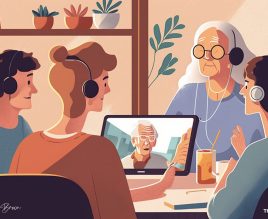Table of Contents
ToggleStepping into the world of technology may seem daunting for many seniors. It’s like stepping into a foreign land, trying to decipher a language that’s entirely alien. It’s not just about learning how to use a smartphone or a computer; it’s about understanding the complex virtual realm, safeguarding personal information, and confidently surfing the web.
And that’s precisely where digital literacy training, online safety measures, and cybersecurity come in. Let’s take a deep dive into this critical topic and examine how older adults can navigate this digital world with ease and assurance. This article delves into the importance of empowering older adults with digital literacy training, online safety, and cybersecurity, creating a safer and more confident digital journey for them.
Digital Literacy Training for Older Adults

Digital literacy is not merely about operating gadgets; it’s a complete understanding of how digital platforms work, how to utilize them efficiently, and how to stay safe while doing so. Just as literacy once opened up a world of books and knowledge, digital literacy now opens up a universe of information and connectivity for seniors.
Essential Digital Skills for Seniors
Digital literacy encompasses a broad range of skills, many of which can greatly benefit seniors. Firstly, the basic operation of devices such as smartphones, computers, and tablets is paramount. From turning devices on and off to navigating interfaces, these are foundational skills that enable further learning.
Beyond these basics, understanding how to use the internet is crucial. This includes knowing how to use search engines to find information, how to send and receive emails, how to engage with others through social media, and how to make online purchases safely.
The internet can be a valuable tool for seniors, facilitating everything from staying in touch with family and friends to accessing medical advice or doing grocery shopping.
Furthermore, seniors need to understand how to create and manage digital content. This can involve organizing files, managing photos, and even using basic word processing software for personal or administrative tasks. Digital content creation is often overlooked but can greatly enhance the usability and enjoyment of digital devices.
Lastly, but perhaps most importantly, are skills related to online safety and cybersecurity. Older adults need to be well-versed in recognizing and avoiding online scams, protecting their personal data, and managing their online presence.
Effective Digital Literacy Training Programs and Resources
Thankfully, numerous programs and resources can equip seniors with digital skills. AARP’s Tech Training for Seniors offers workshops and online guides, covering everything from social media usage to understanding new devices. SeniorNet is another organization providing computer education for older adults, offering courses both online and at local learning centers. In-person classes can also be extremely beneficial.
Many community colleges and adult education centers offer basic computer courses designed specifically for seniors. These courses often focus on practical skills and offer hands-on training. Libraries, too, frequently provide digital literacy workshops and one-on-one tech help sessions.
In terms of online resources, the Digital Learn platform provides tutorials covering a range of topics, from basic computer skills to online privacy. Likewise, websites like TechBoomers offer free educational content tailored for seniors, teaching them about popular websites, apps, and devices. It’s also worth noting the impact of intergenerational programs, where younger generations volunteer to help seniors with technology.
This approach not only offers practical training but also fosters a sense of community and reduces isolation, creating a win-win scenario. For instance, Cyber-Seniors is a program that connects tech-savvy youth with seniors who need assistance navigating the digital world.
Lastly, customized training solutions, like in-home tech tutoring, can be extremely beneficial for those who prefer individualized instruction. Companies like Geeks On Demand or Senior Tech Club offer personalized coaching for older adults, providing them with the necessary knowledge to navigate the digital world independently.
It’s clear that the resources are out there. With the right training programs, seniors can equip themselves with essential digital skills, enabling them to navigate the virtual world confidently and safely.
Online Safety for Older Adults
Phishing, scams, and privacy concerns are common issues that seniors face online. Therefore, it’s vital to not only educate older adults about these threats but also equip them with practical strategies to ensure their safety online. Let’s delve into the common online threats facing seniors and outline some safety tips and best practices they can follow.
Common Online Threats and Risks for Seniors
The internet, while a resourceful tool, can also be a dangerous place. Older adults, due to their relative unfamiliarity with the digital world, often find themselves more vulnerable to cyber threats. These threats can range from email scams and social media fraud to malware and identity theft.
Email scams or ‘phishing’ attacks, where an attacker pretends to be a trustworthy entity to steal sensitive information, are quite prevalent. Seniors are often targeted due to their likelihood of possessing considerable savings, making them attractive to scammers.
Online shopping scams are another risk, with fraudulent websites designed to look like legitimate retailers to trick users into giving their credit card information. Seniors, not being as internet savvy, may have difficulty distinguishing these fake sites from the real ones.
Social media, while a great tool to connect with loved ones, can also present threats. Scammers often create fake profiles to connect with seniors, building a rapport before exploiting them financially.
Lastly, malware – software designed to cause damage to a computer or network – can be a significant risk. Malware can often result from seemingly harmless actions like clicking on a suspicious email link or downloading an unsafe app.
Internet Safety Tips and Best Practices for Older Adults
Given the array of online threats, it’s crucial for seniors to adopt safety measures. Firstly, it’s essential to maintain a strong, unique password for every online account. Consider using a password manager to help remember them.
Be skeptical of unsolicited emails, even if they appear to be from known sources. If an email asks for sensitive information, it’s likely a scam. Always verify the source before sharing any personal or financial information.
When shopping online, ensure the website is secure. A secure site will have ‘https’ in its URL and a lock icon in the address bar. On social media, be cautious about accepting friend requests from unfamiliar people.
Regularly review privacy settings to ensure your information isn’t shared with people you don’t know. Lastly, keep all software, including antivirus software, updated. Regular updates often contain security patches that protect against new threats.
Cybersecurity Measures for Seniors
For seniors, understanding cybersecurity is crucial to protect their personal information, finances, and identity while using digital platforms. In the following sections, we will unravel the concept of cybersecurity and provide practical tips that older adults can follow to enhance their digital safety.
Understanding Cybersecurity and Its Importance
Cybersecurity is the practice of safeguarding devices, networks, and data from digital attacks. It involves implementing measures to prevent unauthorized access, use, disclosure, disruption, modification, or destruction of information.
Seniors, often less familiar with technology, may inadvertently expose themselves to cyber threats, risking their privacy and financial security. It’s important to understand that anyone connected to the internet can become a victim of cyber threats, so cybersecurity measures are crucial for all internet users, regardless of their age.
Recognizing the importance of cybersecurity is the first step toward safer digital experiences. It enables seniors to protect their personal information, maintain their privacy, avoid financial losses from scams or fraud, and enjoy the digital world with confidence and peace of mind.
Practical Cybersecurity Tips for Older Adults
Now, having understood the importance of cybersecurity, let’s focus on some practical measures that seniors can adopt. Firstly, always keep your operating system, browser, and other software up-to-date. Updates often include patches that fix security vulnerabilities.
Use reliable antivirus software and ensure it is also kept updated. It serves as a primary defense against most forms of malware. Implement strong, unique passwords for all your online accounts and consider using a reputable password manager to manage them.
Never share personal or financial information over email or on unsecured websites. Be skeptical of unsolicited messages asking for such data. Enable two-factor authentication (2FA) for added security. It provides an extra layer of protection, making it harder for attackers to access your accounts even if they know your password.
Remember, cybersecurity isn’t a one-time event; it’s an ongoing process. Regularly review your online habits and stay updated about latest cyber threats to maintain your digital safety.
Real-Life Examples and Anecdotes
This section highlights three such anecdotes: a senior’s journey to digital literacy, an older adult’s experience with online safety, and a senior’s successful implementation of cybersecurity measures. These stories reinforce the significance of the topics discussed and provide relatable experiences for other seniors on the digital journey.

A Senior’s Journey to Digital Literacy
Meet Alice, a 75-year-old who embraced the digital world after her grandchildren moved overseas. Alice’s journey began with learning to operate a smartphone to stay connected with her family. She then enrolled in a local digital literacy program that taught her how to send emails, make video calls, and use social media.
Eventually, Alice even started using e-commerce platforms for her shopping needs. Today, she feels empowered and less dependent, proving that age is no bar to acquiring digital skills and enhancing the quality of life.
An Older Adult’s Experience with Online Safety
George, 68, learned about online safety the hard way. He received an email, seemingly from his bank, asking him to update his account details. George complied, only to find out later it was a phishing scam.
He lost a significant sum of money but turned his experience into a lesson for others. He now regularly attends online safety workshops and has become an advocate for educating seniors about internet scams and safe online practices.
A Senior’s Successful Implementation of Cybersecurity Measures
Martha, a 70-year-old retiree, took her cybersecurity seriously. After attending a cybersecurity workshop, she started using unique, strong passwords for all her accounts and activated two-factor authentication wherever possible.
She also keeps her software updated and regularly reviews her online habits to ensure she’s following safe practices. Martha’s diligence paid off when she detected a malware attempt on her device, and her antivirus software, kept up-to-date, handled it effectively.
Implications and Future Developments
As the world continues to digitize and the older adult population grows, digital literacy, online safety, and cybersecurity become ever more crucial. In this final section, we’ll explore the escalating importance of digital literacy in an aging society and how technological advancements can impact online safety and cybersecurity for older adults.
The Growing Importance of Digital Literacy in an Aging Society
An aging population coupled with an increasingly digital society puts digital literacy at the forefront of necessary skills for seniors. The digital divide can lead to isolation, reduced access to information, and other challenges for older adults. As such, digital literacy training becomes crucial to empower seniors, facilitating their active participation in society.
Digital literacy promotes independence, as it enables seniors to perform tasks like banking, shopping, or seeking medical advice online. It also promotes social connectivity, enabling older adults to maintain contact with family and friends, thereby combating feelings of isolation and loneliness.
Moreover, as telemedicine and e-health services become more mainstream, digital literacy can directly impact seniors’ health and wellness by allowing them easy access to healthcare services.
Advancements in Technology and Their Impact on Online Safety and Cybersecurity
As technology evolves, so do the threats associated with it. However, technological advancements also present opportunities to enhance online safety and cybersecurity. For instance, machine learning and AI can be used to detect and thwart cyber threats more effectively, improving the safety of online platforms.

Conversely, as we embrace new technologies like IoT, which connects various devices on a network, we expose ourselves to potential new vulnerabilities. Therefore, staying updated about these technologies, their potential risks, and safety measures becomes critical.
Future developments also promise more intuitive and user-friendly interfaces, making it easier for seniors to adapt. Improved voice recognition, for instance, can simplify interaction with devices, reducing the need for intricate manual inputs.
Clearly, the future of online safety and cybersecurity for older adults lies in a balanced approach—leveraging technological advancements for improved security while also educating seniors about potential risks and safety practices. After all, the key to navigating the digital world confidently lies in continuous learning, adaptation, and vigilance.
Conclusion
In today’s increasingly digital world, it’s imperative that we ensure everyone, including our senior population, can navigate the internet confidently and safely. Digital literacy empowers older adults, helping them to maintain connections, access information, and services, and participate actively in the modern world. But it’s not just about empowerment – it’s also about protection.
Awareness of online safety practices and cybersecurity measures can help protect seniors from scams, fraud, and identity theft. From our exploration of digital literacy training to online safety and cybersecurity for older adults, it’s clear that education, ongoing support, and access to resources play crucial roles in making the digital world more inclusive for seniors.
As technology continues to evolve, it’s vital that we ensure our older generation isn’t left behind. After all, the digital world offers immense benefits, but only if we can navigate it safely and competently.
FAQs
Why is digital literacy important for older adults?
Digital literacy is crucial for older adults as it promotes independence, facilitates social connection, and provides access to numerous online services and information, enhancing their quality of life in today’s digital age.
What can seniors do to stay safe online?
Seniors can stay safe online by using strong, unique passwords, being cautious with email and social media, ensuring websites are secure before sharing information, and keeping their software updated.
How can older adults protect themselves from cyber threats?
Older adults can protect themselves by practicing good cybersecurity habits such as using antivirus software, regularly updating their devices and apps, enabling two-factor authentication, and being vigilant about sharing personal or financial information online.
What resources are available to help seniors improve their digital skills?
Various resources such as local community centers, libraries, online courses, intergenerational programs, and personalized training solutions can help seniors improve their digital skills.
How can family members and caregivers support seniors in navigating the digital world?
Family members and caregivers can help by patiently teaching seniors how to use digital devices and applications, encouraging them to learn, and directing them to resources and training programs that can enhance their digital skills.
Are there any specific cybersecurity tools or software recommended for seniors?
Reliable antivirus software, password managers, and two-factor authentication apps are highly recommended. Software should be user-friendly and have automatic updates to ensure continual protection against cyber threats.
References
- https://extranet.who.int/
- https://www.mcafee.com/
- https://officeforseniors.govt.nz/

















